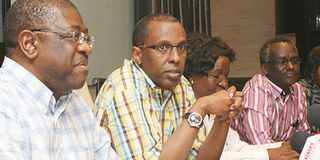Why panel forwarded only two nominees

File | NATION
Members of the Judicial Service Commission, from left Attorney General Amos wako, Mr Ahmednasir Abdullahi, Prof Christine Mango and Mr justice Isaac Lenaola when they invited applications for the position of Chief Justice.
A desire to avoid the political bickering that has characterised appointments to high-profile public offices informed the decision by the Judicial Service Commission to forward the name of only one nominee each to the Executive for the posts of chief justice and the deputy.
The decision has since elicited murmurs from a section of MPs who contend that the JSC’s decision ties the hands of President Kibaki and Prime Minister Raila Odinga as well as Parliament in making the appointments.
The JSC announced on Friday that it had nominated Dr Willy Mutunga and Nancy Barasa as chief justice and deputy chief justice respectively. (READ: Lawyer Mutunga nominated for CJ post)
The names were forwarded to President Kibaki and Prime Minister Raila Odinga for processing and onward transmission to Parliament for debate.
While faulting the nomination of only Dr Mutunga and Ms Barasa, Nairobi Metropolitan minister Njeru Githae argued that by forwarding only the two names to the Executive for consideration, the JSC had in effect arrogated itself the full powers to appoint the two officials.
“They have given the Executive a fait accompli. A president does not look at qualifications only as JSC did; he also has other issues to consider like ethnic balancing and all that. But in this case, JSC tied the hands of the Executive and even Parliament in this process,” he said.
However, a member of the JSC who asked not to be named since he is not authorised to speak on behalf of the commission told the Sunday Nation that they arrived at a consensus on forwarding only two names after considering the acrimony past appointments have raised.
“We realised that we had the perfect opportunity to break away from politicisation of this process. Had we submitted more names, then our politicians would have commenced the horse-trading which would have led to more bickering which would have in turn led to delay in implementing the new Constitution,” said the commissioner.
Furthermore, the commissioner said the law is on their side. “The Constitution states that we forward “a name” and not “names” to the two principals in respect of the chief justice and his deputy,” he said.
He added: “In any case we did not receive a request for a shortlist from the two principals.”
Asked about it, Prime Minister Raila Odinga’s spokesman Dennis Onyango said “I have not heard the PM complain, so I don’t think it is an issue we can discuss.”
Former Gatanga MP David Murathe cautioned that the trend of forwarding only one name could present problems in future appointments.
“It is only that these two appointments have been widely accepted. But what of a situation where the names presented are not acceptable to the President and Parliament?
“It would necessitate the process to be started again, and this will be time consuming and financially draining” he said.
Nominated MP Rachel Shebesh criticised those arguing that JSC ought to have forwarded more names to the Executive, saying that would have undermined the transparency of the process and opened new battlefronts between ODM and PNU.
“You are well aware that every high-profile appointment in Kenya carries with it political and ethnic overtones.
“By submitting only two nominations, JSC should be commended for saving us the political bickering that has attended other nominations,” she said.
Defence assistant minister David Musila said the appointment process was in order. “I don’t think it could have been done in any other better way.
“For JSC to have given only two names, then I think they were convinced that no one else among the candidates merited that position,” he said.
The vetting process of the chief justice and his deputy is unprecedented. It marked the first time interview of seekers of high public office are being conducted in public, one of the requirements of the new Constitution.
The nomination of the Dr Mutunga, a former detainee and a reformer, and his deputy Nancy Barasa, a founder of International Federation of Women Lawyers (Fida), has drawn huge support from the public and across the political divide.
PNU secretary-general Kiraitu Murungi says his party will support the nominees when their names are presented to Parliament. He praised JSC for the nominations saying the Dr Murunga and Ms Barasa were the best for the job.
“He is a thorough person and pro-poor. He is going to stand up for the rights of the oppressed and marginalised Kenyans. We are certain he will correct the mess in judiciary made in past decades,” Mr Murungi said of Dr Murunga.
Sports and Youth Affairs assistant minister Kabando wa Kabando also welcomed the nominations.
“It is a milestone, a radical shift from the old order. Momentous it is. The old order is being crushed by the new dawn; political interests are subdued,” Mr Kabando said.
Lands minister James Orengo termed the nominations “the most important to have been made in the Judiciary for the last four decades.”
Mr Odinga’s adviser Salim Lone said the nominations “reflect yet another extraordinary milestone in the growing democratic space that Kenyans have been able to expand under the Grand Coalition Government.”
Igembe South Mithika MP Linturi said the duo must restore the confidence of Kenyans in the judicial sector within the shortest time possible.
“Their leadership must demonstrate that it won’t be business as usual .
Nearly all Kenyans and foreign investors had lost faith and trust in our judiciary due to run-away corruption and inefficiency,” Mr Linturi said on Saturday at Isebania PAG church during a fundraiser.




